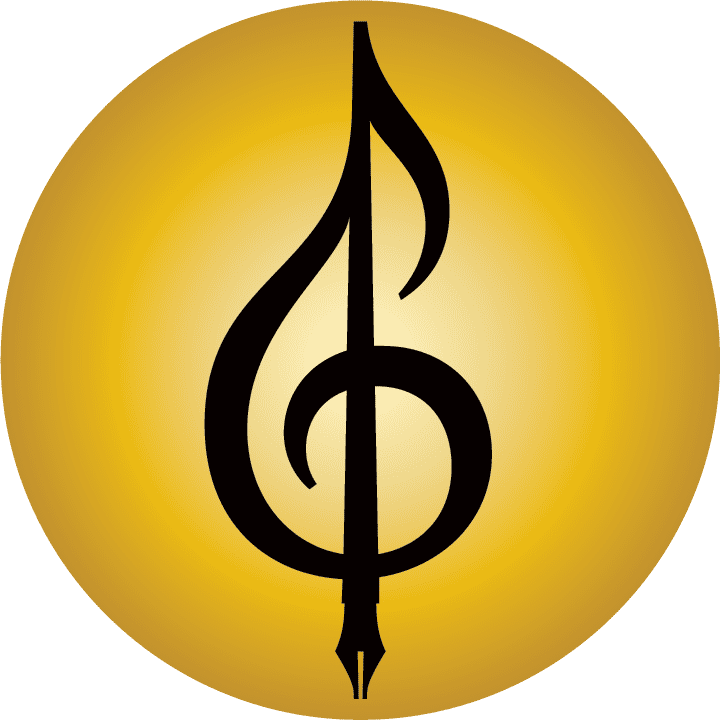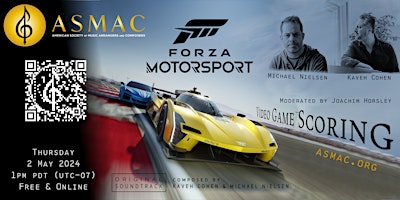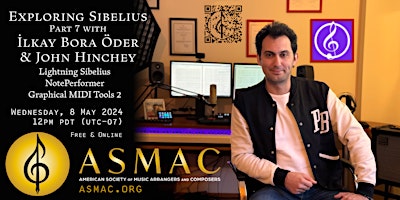By Jeannie Pool
The ASMAC luncheon held September 19, 2007 at Catalina’s Bar and Grill featured a panel discussion of veteran Hollywood studio recording musicians, moderated by composer and orchestrator Ira Hearshen. The panelists were Gayle Levant, harp; Rick Baptist, brass; Earle Dumler, oboe; Dennis Karmazyn, cello; and Mike Lang, piano/keyboards, all with more film and television credits than could possibly be listed here. Ira Hearshen introduced them by saying that the panelists represent “the musicians who really know what it is like to play what we write.”
Ira Hearshen asked the panelists “How did you get here” and the panelists took turns describing their background. Keyboardist Michael Lang grew up in Los Angeles and his first piano teacher was Gertrude Floyd. He studied with composer George Tremblay, whom he described as “the most important musical person in my life.” Tremblay exposed him to all kinds of music and taught him theory and harmony. Then he went to the University of Michigan, where he studied with Leslie Bassett, among others. After a stint in the army in 1964, he returned to Los Angeles and played in jazz groups and worked with Lalo Schifrin and Phil Spector. Lang has also appeared with Oliver Nelson, Shelly Manne, Don Ellis, Louie Bellson, Sonny Stitt, Stan Kenton, Art Pepper, and Stan Getz. He has recorded with Michael Bolton, Natalie Cole, Barbra Streisand and Frank Zappa, among others.
Trumpeter Rick Baptist was born with asthma and when his lung collapsed his doctor urged him to play a wind instrument to strengthen his lung capacity. He grew up in the Bay Area and had excellent teachers in the public schools. Baptist said, “I always knew that this is what I wanted to do.” He saw an Oscar broadcast at the age 13 and decided he wanted to grow up to play on the Oscars. He worked with Bobby Darin and started touring at age 20. He played in Reno and Las Vegas for many years and Ian Fraser urged him to come to Los Angeles, which he did in 1980. “It was a dream and it is still a dream.” Today he is playing on the Oscars (lead trumpet on the Academy Awards show for 24 years) and live on the Emmy-winning hit show, “Dancing with the Stars” in a seven-piece band. He said he hoped that the show will inspire other producers to use live music for television broadcasts. “The day I wake up and say ‘It’s not fun,’ is the day I quit.”
Earle Dumler was born in Russell, Kansas, where they had a great high school band program. “The Lawrence Welk Show” on television inspired him to become a professional musician. He attended the University of Kansas and New England Conservatory, and landed a job right out of school as principal oboist in the Norfolk Virginia Symphony. He toured with the Stan Kenton Band, playing baritone and bass saxophones. In 1968, he moved to Los Angeles, where he played baritone sax on some Motown recordings. He also played with Frank Zappa and The Mothers of Invention. His first instrument, though, has always been the oboe, which he describes as “a rather poignant instrument.” He played all the sessions with David Rose for “Bonanza” and “Little House on the Prairie.” Michael Landon told him that “As long as they are crying and dying, you’ll be working.”
One of the best-known harpists in Hollywood, Gayle Levant “loves our business with a passion.” She is much appreciated because of her ability to improvise harp parts in records sessions and live performance. She has worked with Ray Charles, Frank Sinatra, Stevie Wonder, Joni Mitchell, Barry Manilow, Paul McCartney, Lateefa, Christine Aguilera, Barbra Streisand, among many others. She was first harpist to receive the Most Valuable Player award from the National Association of Recording Arts and Sciences. She continued to receive that award annually until they honored her with their Emeritus Award. Gayle is currently playing on the television series, “Lost” and “The Simpsons” (now beginning her 19th season). She has also played on the Academy Awards broadcasts for many years.
Born in Los Angeles, Gayle’s father, Mark Levant, was a violinist/concert master. She started piano lessons at age 3 and at 11 started playing the harp. She studied piano with Jacob Gimpel. At age 15, she played piano with Charlie Bernstein in the Fairfax High School production of the musical “The Boy Friend.” She played in a trio at Lucy’s restaurant on Melrose in Hollywood, accompanying four opera singers and played with Liberace, Nat King Cole, Judy Garland, Andy Williams and Henry Mancini in Tahoe. When playing with the Monsignor Strings, under the director of Murray Korda, at the Beverly Hilton, she was spotted by the entertainment director for the Las Vegas Dunes Hotel. He asked if she would play harp on a boat in a moot in a restaurant called “Dome of the Sea” which was being constructed at the hotel; she agreed and it was designed to her specifications. Soon she was performing with Henry Mancini, Julie Andrews, André Previn, among others. Gayle Levant is featured on hundreds of recordings, motion pictures, and television shows.
Cellist Dennis Karmazyn’s father, a European refuge from World War II, was a violinist in the Los Angeles Philharmonic. With his father as his first teacher, Dennis began playing the cello in elementary school. He began recording in his early teens on sessions with composer Jimmy Haskell. At 15, he played a Haydn cello concerto with the Los Angeles Philharmonic and the next year went to Paris Conservatory to study. For the “Pageant of the Masters” in Laguna, he played Niccolo Paginini’s “Perpetual Motion” for 60 nights in a row and at age 19 began working regularly in the studios. Now he is first cellist with the Hollywood Bowl Orchestra and is constantly in demand for studio gigs.
Hearshen asked the panelists to describe some of the challenges of being a studio musician. Earle Dumler said that it is part of the job of a studio recording musicians “to make it work,” and not complain, but make the boss look as good as possible. Rick Baptist agreed and said that he always looks for opportunities to enhance a piece of music. Mike Lang said, “We are solving problems,” and that sometimes the job requires some acting skills. Dennis pointed out that one of the biggest problems is there are fewer and fewer interpretive marking on scores at sessions and there is no rehearsal time, so it puts inordinate pressure on the musicians. Rick said the biggest problem is that some composers are “over writing” and sometimes it just kills the musicians for no good reason or result.
Ira Hearshen asked the panelists to tell the audience about their best moment in their professional careers. Michael Lang told a story about playing Mozart sonata at a Lalo Schifrin session. Schifrin had put a volume of the Mozart sonatas on his stand and did not indicate what Lang would be asked to record. When Lang asked which one they wanted, Schifrin told him not to worry; that it would be fine. Then at the end of session, Lang was asked to sight read from the volume as long as he could. When he finally made a mistake, after 15 minutes or so, they stopped recording and said they had enough. “I learned that with the technology it was possible to make things work.” Rick Baptist talked about a session at Warners for “Animaniacs” during which he had to phone the recording booth to request more click for the brass players.
Then Ira Hearhsen asked to hear about the funniest thing that ever happened at a recording session. Mike said once in a session with David Rose, that Mike played two bars too long in a cue. When he tried to point it out to David Rose, Rose said to someone else loud enough so Mike could overhear him, “So, he thinks I didn’t hear that?”
Earl said that he remembered on a “Little House on the Prairie” session that there was a solo part written in all the parts and at the session one player would be asked to do it, based on David Rose’s wishes at that moment. One time Lincoln Majorca borrowed Earl’s oboe to play the solo part when Rose asked him to play it (on piano). Dennis recalled that at a Hollywood Bowl Orchestra concert he had a four-minute solo and became hopelessly lost, but somehow made a recovery.
Composers, arrangers, and orchestrators in the audience expressed their respect and admiration for these session players, and all Los Angeles session players, for the remarkable job they do in the industry. All of the panelists expressed the sincerest gratitude for the careers they have in Los Angeles entertainment business and their deep passion for music.



